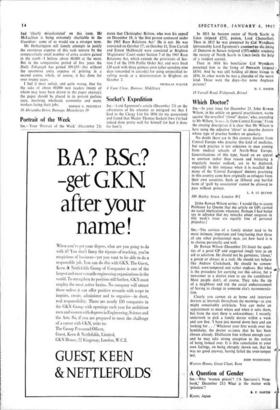SIR,—The services of a family doctor tend to be more
intimate, important and long-lasting than those of any other professional man, yet how hard it is to choose personally and well.
Dr Rowan Wilson (December 23) listed the quali- ties of a good GP and suggested rough tests as an aid to selection. He should not be garrulous, 'clever,' a gossip or always in a rush. He should not behave like Andrew Cruikshank. He should be conven- tional, even-tempered and rather studious. But what is the procedure for carrying out this advice, for a newcomer to a district even to see the candidates? Most people don't, of course. They take the tip of a neighbour and risk the social embarrassment of having to change to someone else's recommenda- tion.
Clearly you cannot sit at home and interview doctors at intervals throughout the morning—as you might conceivably architects. You can make an appointment to meet where and when it suits them, but from the start there is awkwardness: I recently undertook to pick a family doctor within a week and saw five. 'I have just moved down here and am looking for . . .' Whatever your first words over the handshake, the doctor assumes that he has been chosen already. Disillusion him without enough care and he may take strong exception to the notion of being looked over. It is thin consolation to your own feelings, on being abruptly shown out, that he was no good anyway, having failed the even-temper test.
Worsen House, Great Chart, Kent
JOHN WOODFORDE






























 Previous page
Previous page